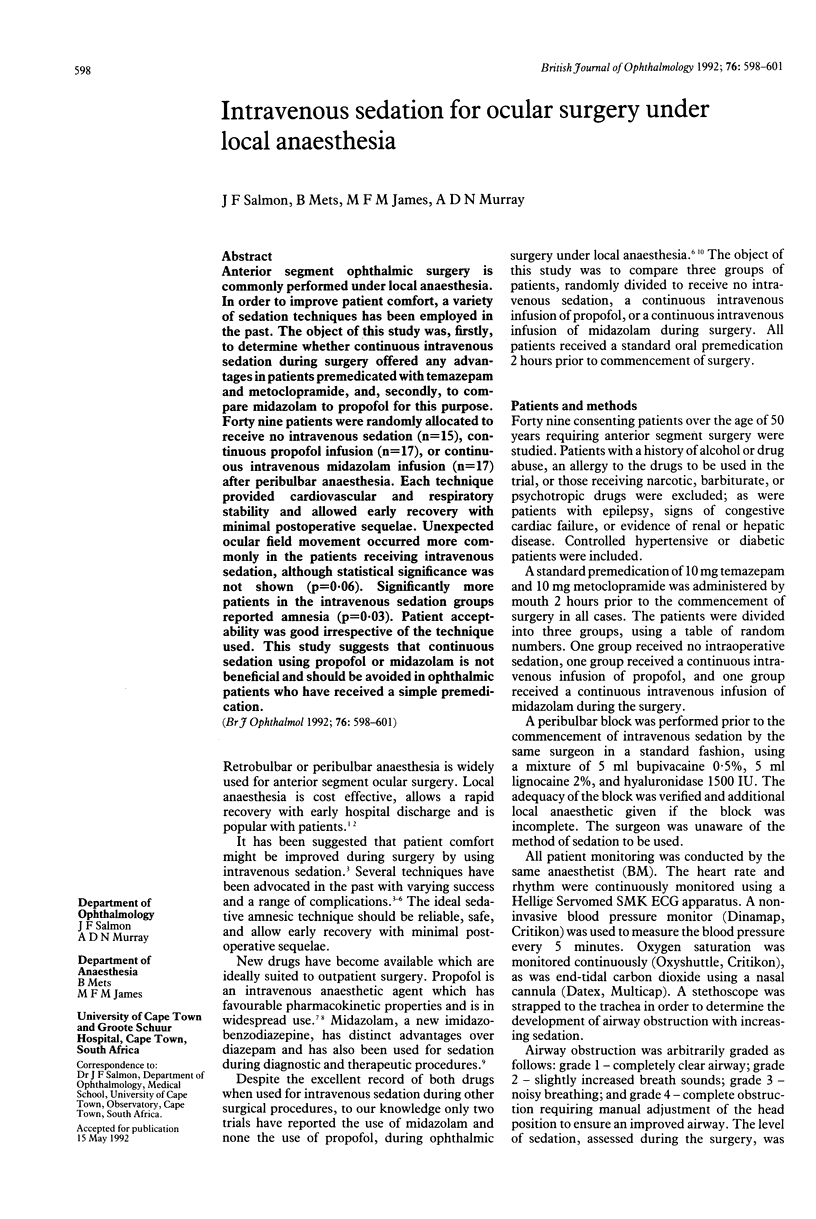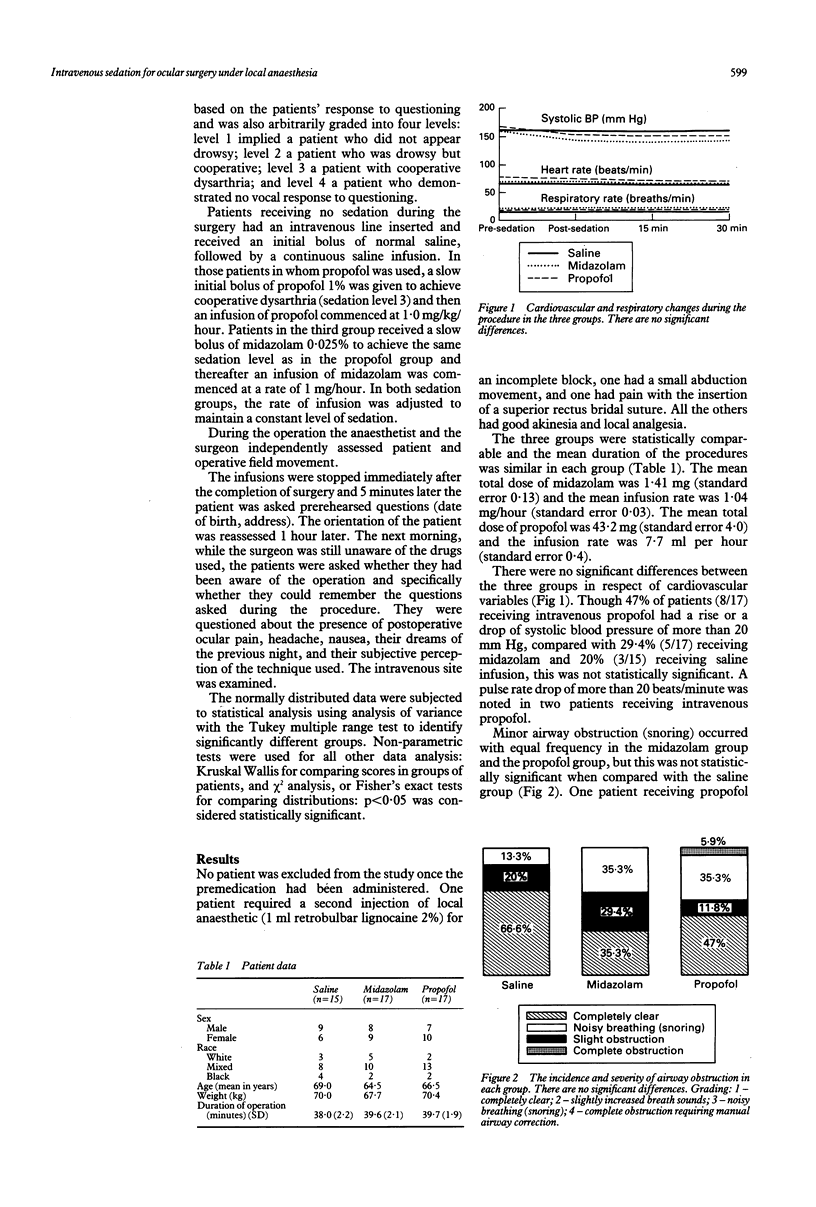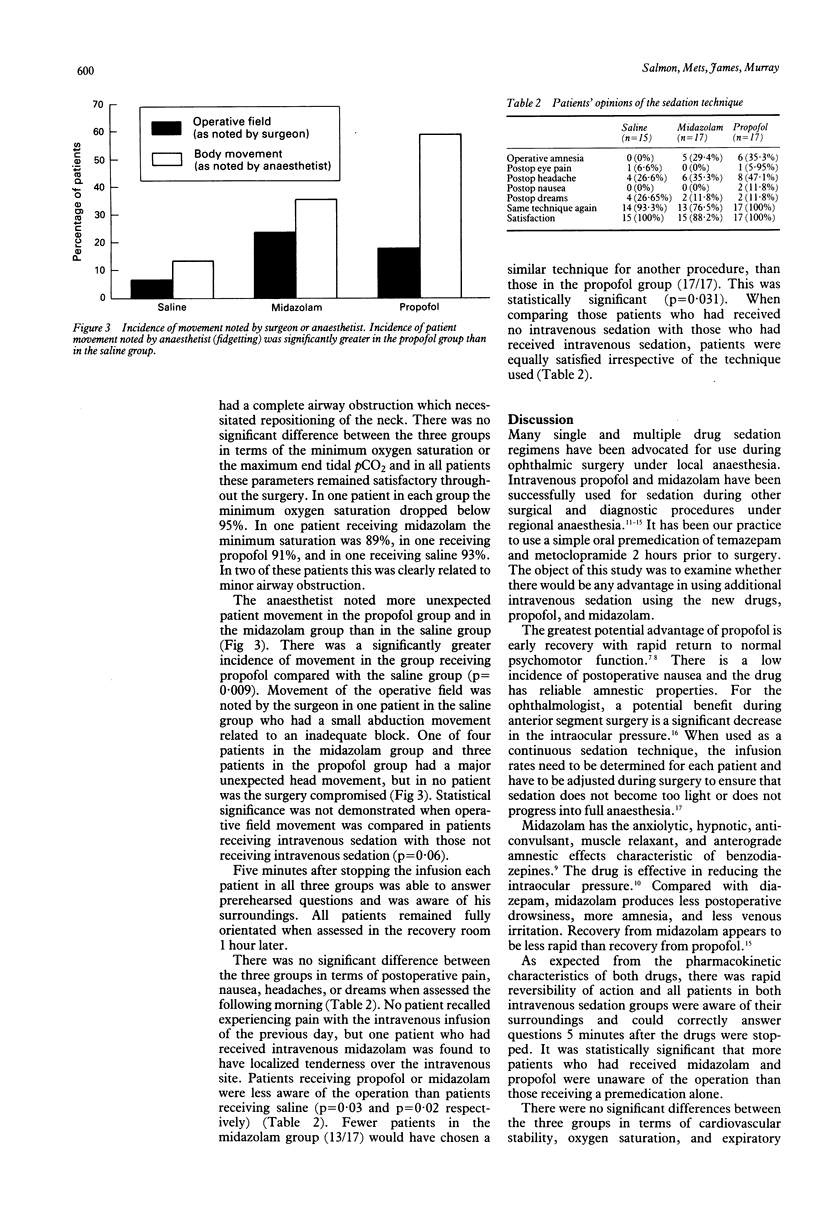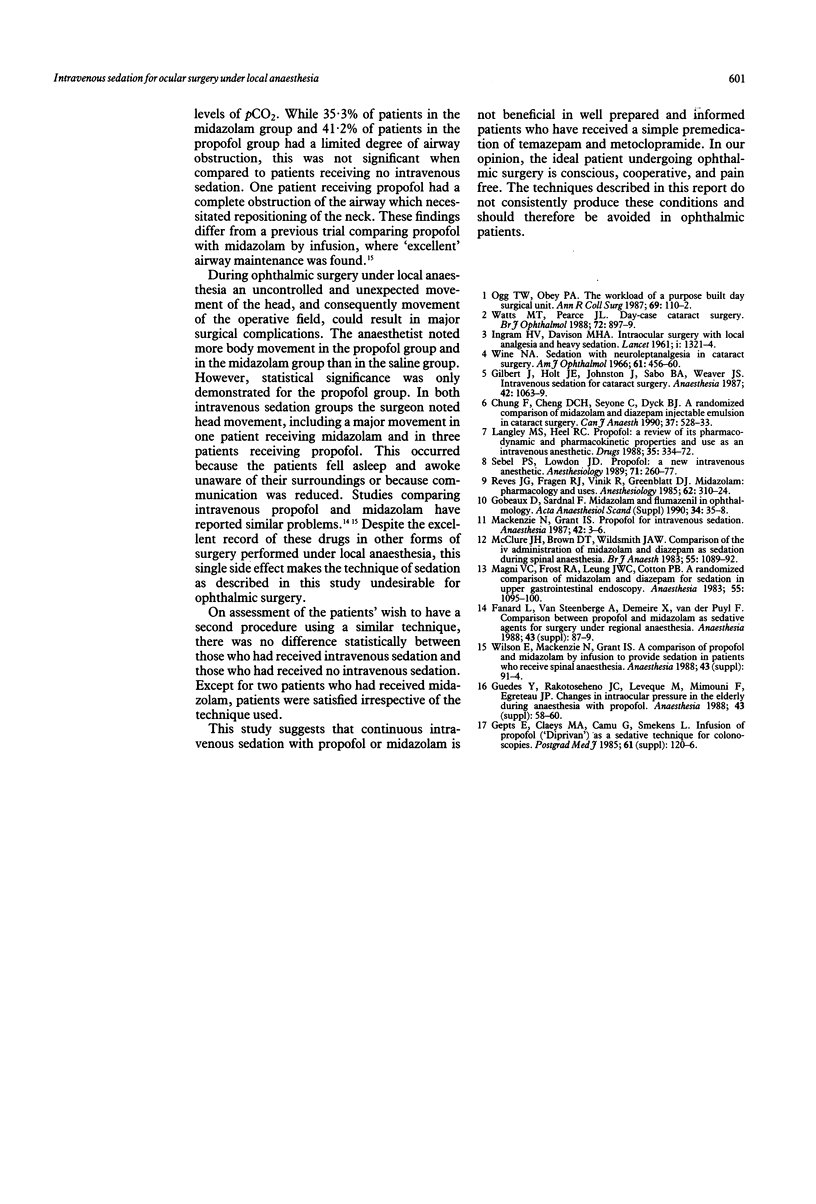Abstract
Anterior segment ophthalmic surgery is commonly performed under local anaesthesia. In order to improve patient comfort, a variety of sedation techniques has been employed in the past. The object of this study was, firstly, to determine whether continuous intravenous sedation during surgery offered any advantages in patients premedicated with temazepam and metoclopramide, and, secondly, to compare midazolam to propofol for this purpose. Forty nine patients were randomly allocated to receive no intravenous sedation (n = 15), continuous propofol infusion (n = 17), or continuous intravenous midazolam infusion (n = 17) after peribulbar anaesthesia. Each technique provided cardiovascular and respiratory stability and allowed early recovery with minimal postoperative sequelae. Unexpected ocular field movement occurred more commonly in the patients receiving intravenous sedation, although statistical significance was not shown (p = 0.06). Significantly more patients in the intravenous sedation groups reported amnesia (p = 0.03). Patient acceptability was good irrespective of the technique used. This study suggests that continuous sedation using propofol or midazolam is not beneficial and should be avoided in ophthalmic patients who have received a simple premedication.
Full text
PDF



Selected References
These references are in PubMed. This may not be the complete list of references from this article.
- Chung F., Cheng D. C., Seyone C., Dyck B. J. A randomized comparison of midazolam and diazepam injectable emulsion in cataract surgery. Can J Anaesth. 1990 Jul;37(5):528–533. doi: 10.1007/BF03006320. [DOI] [PubMed] [Google Scholar]
- Fanard L., Van Steenberge A., Demeire X., van der Puyl F. Comparison between propofol and midazolam as sedative agents for surgery under regional anaesthesia. Anaesthesia. 1988 Mar;43 (Suppl):87–89. doi: 10.1111/j.1365-2044.1988.tb09082.x. [DOI] [PubMed] [Google Scholar]
- Gepts E., Claeys M. A., Camu F., Smekens L. Infusion of propofol ('Diprivan') as sedative technique for colonoscopies. Postgrad Med J. 1985;61 (Suppl 3):120–126. [PubMed] [Google Scholar]
- Gilbert J., Holt J. E., Johnston J., Sabo B. A., Weaver J. S. Intravenous sedation for cataract surgery. Anaesthesia. 1987 Oct;42(10):1063–1069. doi: 10.1111/j.1365-2044.1987.tb05169.x. [DOI] [PubMed] [Google Scholar]
- Gobeaux D., Sardnal F. Midazolam and flumazenil in ophthalmology. Acta Anaesthesiol Scand Suppl. 1990;92:35–38. doi: 10.1111/j.1399-6576.1990.tb03179.x. [DOI] [PubMed] [Google Scholar]
- Guedes Y., Rakotoseheno J. C., Leveque M., Mimouni F., Egreteau J. P. Changes in intra-ocular pressure in the elderly during anaesthesia with propofol. Anaesthesia. 1988 Mar;43 (Suppl):58–60. doi: 10.1111/j.1365-2044.1988.tb09072.x. [DOI] [PubMed] [Google Scholar]
- INGRAM H. V., DAVISON M. H. Intraocular surgery with local analgesia and heavy sedation. Lancet. 1961 Jun 17;1(7190):1321–1324. doi: 10.1016/s0140-6736(61)90241-0. [DOI] [PubMed] [Google Scholar]
- Langley M. S., Heel R. C. Propofol. A review of its pharmacodynamic and pharmacokinetic properties and use as an intravenous anaesthetic. Drugs. 1988 Apr;35(4):334–372. doi: 10.2165/00003495-198835040-00002. [DOI] [PubMed] [Google Scholar]
- Mackenzie N., Grant I. S. Propofol for intravenous sedation. Anaesthesia. 1987 Jan;42(1):3–6. doi: 10.1111/j.1365-2044.1987.tb02936.x. [DOI] [PubMed] [Google Scholar]
- Magni V. C., Frost R. A., Leung J. W., Cotton P. B. A randomized comparison of midazolam and diazepam for sedation in upper gastrointestinal endoscopy. Br J Anaesth. 1983 Nov;55(11):1095–1101. doi: 10.1093/bja/55.11.1095. [DOI] [PubMed] [Google Scholar]
- McClure J. H., Brown D. T., Wildsmith J. A. Comparison of the i.v. administration of midazolam and diazepam as sedation during spinal anaesthesia. Br J Anaesth. 1983 Nov;55(11):1089–1093. doi: 10.1093/bja/55.11.1089. [DOI] [PubMed] [Google Scholar]
- Ogg T. W., Obey P. A. The workload of a purpose built day surgical unit. Ann R Coll Surg Engl. 1987 May;69(3):110–112. [PMC free article] [PubMed] [Google Scholar]
- Reves J. G., Fragen R. J., Vinik H. R., Greenblatt D. J. Midazolam: pharmacology and uses. Anesthesiology. 1985 Mar;62(3):310–324. [PubMed] [Google Scholar]
- Sebel P. S., Lowdon J. D. Propofol: a new intravenous anesthetic. Anesthesiology. 1989 Aug;71(2):260–277. [PubMed] [Google Scholar]
- Watts M. T., Pearce J. L. Day-case cataract surgery. Br J Ophthalmol. 1988 Dec;72(12):897–899. doi: 10.1136/bjo.72.12.897. [DOI] [PMC free article] [PubMed] [Google Scholar]
- Wilson E., Mackenzie N., Grant I. S. A comparison of propofol and midazolam by infusion to provide sedation in patients who receive spinal anaesthesia. Anaesthesia. 1988 Mar;43 (Suppl):91–94. doi: 10.1111/j.1365-2044.1988.tb09084.x. [DOI] [PubMed] [Google Scholar]
- Wine N. A. Sedation with neuroleptanalgesia in cataract surgery. Am J Ophthalmol. 1966 Mar;61(3):456–460. doi: 10.1016/0002-9394(66)91051-8. [DOI] [PubMed] [Google Scholar]


